- Home
- C. G. Cooper
The Warden's Son
The Warden's Son Read online
The Warden’s Son
C. G. Cooper
Contents
Dedications
Prologue
Chapter 1
Chapter 2
Chapter 3
Chapter 4
Chapter 5
Chapter 6
Chapter 7
Chapter 8
Chapter 9
Chapter 10
Chapter 11
Chapter 12
Chapter 13
Chapter 14
Chapter 15
Chapter 16
Chapter 17
Chapter 18
Chapter 19
Chapter 20
Chapter 21
Chapter 22
Chapter 23
Chapter 24
Chapter 25
Chapter 26
Chapter 27
Chapter 28
Chapter 29
Chapter 30
Chapter 31
Chapter 32
Chapter 33
Chapter 34
Chapter 35
Chapter 36
Chapter 37
Chapter 38
Chapter 39
Chapter 40
Chapter 41
Chapter 42
Chapter 43
Chapter 44
Chapter 45
Chapter 46
Chapter 47
Chapter 48
Chapter 49
Chapter 50
Chapter 51
Chapter 52
Chapter 53
Chapter 54
Chapter 55
Chapter 56
Chapter 57
Chapter 58
Chapter 59
Chapter 60
Chapter 61
Chapter 62
Chapter 63
Chapter 64
Chapter 65
Chapter 66
Chapter 67
Chapter 68
Chapter 69
Chapter 70
Chapter 71
Chapter 72
Chapter 73
Chapter 74
Chapter 75
Chapter 76
Chapter 77
Chapter 78
Chapter 79
Chapter 80
Chapter 81
Chapter 82
Chapter 83
Chapter 84
Chapter 85
Chapter 86
Chapter 87
Chapter 88
Chapter 89
Chapter 90
Chapter 91
Chapter 92
Chapter 93
Chapter 94
Chapter 95
Chapter 96
Chapter 97
Chapter 98
Chapter 99
Chapter 100
Chapter 101
Chapter 102
Chapter 103
Chapter 104
Chapter 105
Chapter 106
Chapter 107
Chapter 108
Chapter 109
Chapter 110
Chapter 111
Chapter 112
Chapter 113
Chapter 114
Epilogue
Also by C. G. Cooper
About the Author
“THE WARDEN’S SON”
By C. G. Cooper
Copyright © 2019 JBD Entertainment, LLC. All Rights Reserved
This is a work of fiction. Characters, names, locations and events are all products of the author’s imagination. Any similarities to actual events or real persons are completely coincidental.
This novel contains violence and profanity. Readers beware.
A portion of all profits from the sale of my novels goes to fund OPERATION C4, our nonprofit initiative serving young military officers. For more information visit OperationC4.com.
Want to stay in the loop?
Sign Up at cg-cooper.com to be the FIRST to learn about new releases.
Plus get newsletter only bonus content for FREE.
Click here to sign up.
Dedications
JC, thanks for telling me your story. I hope this fictional tale puts an exclamation point on your childhood :)
Paul L., your talent never ends.
Glenda, you inspire me with your heart and dedication.
And a big thanks to our Beta Readers: Marry, Paul, Michael, Melissa, Sue, Sandy, Connie, Nancy, Cheryl, Don, Larry, Julie, Dawn, Gayle, Donald, Bob, Judith and Bernie.
Prologue
I guess the most important thing to say upfront was that the summer of 1987 was a pivotal time in my life. I was ten. I made a new best friend. And I became a murderer. Yep. You heard right.
The summer of 1987 was the ninth stop for yours truly on the great prison tour of my childhood. Every year a new town and a new prison to explore.
I wasn’t yet a murderer. Not at the beginning. Just the plain old son of a warden wearing jeans with permanent grass stains and threadbare sneakers that wore on me more than I wore them.
Now I wear a suit every day, Sunday through Saturday. I guess in the grand scheme of things it’s not the worst quirk to have. I’m not addicted to pills or buying dishes on late-night TV. No, I’m that guy who, in the world of going more casual, has decided to wear a suit. Sometimes I’ll even wear a vest to really take things up a notch. My wife calls it my chauffeur look.
I got the suit thing from the warden. That’s Dad. It was his thing first. We still talk from time to time.
Life as the son of a federal prison warden never felt weird until I turned ten. I was still a naive waif until that nasty summer when everything changed.
Now I sit here in my suit, so far removed from the boy of 1987 Virginia that I feel like I’m perfectly qualified to judge him. But when the window’s open, all I have to do is touch a breeze that carries the gluey stink of split black locust, or hear the froggy grind of a woodcock’s call, and then I’m no longer qualified. There I am, back under the hot sun, at the edge of the creek stinking of heat and moss. I am that boy again. And I can make out the line of Redcoats marching in ramrod-straight formation along a pink-feathered sea of mountain laurel in the distance . . .
Chapter One
June 1987
The jolt of the car hitting a pothole shook me from ice cream dreams.
I moaned through a yawn.
Dad had the driver’s side window cracked and blew a long line of smoke through it.
“Another hour,” he said. He had a pretty good grasp of child-speak.
I knew better than to answer this with a further complaint. The warden preached patience.
“Only a little while longer, Jimmy,” Mom said, not looking up from the book she was reading.
I looked over at Larry, who was sucking his thumb, his blanket plastered to the side of his face. He was half asleep, so I did what any big brother would do.
I nudged him in the ribs and said, “Sucking your thumb is for babies.”
“I’m not a baby!” Larry barked, fully awake now.
“James Michael Allen,” the warden said in between cigarette pulls. His voice was gravel tough, honed from decades of leading some of the toughest men in the federal penal system.
“Sorry, Dad,” I said, and threw a stuck-out tongue at my brother. He responded with a shit-eating grin—one point, Larry. I’d get him back for that later.
“Hey, why don’t we play a game?” Mom said, clapping her book shut as if giving up on it forever.
“Mom.” I drew her name out like a train horn.
She turned around in her seat. “Jimmy, you used to love road games.”
Larry said, “Would You Rather!”
“How ‘bout it, Jimmy? Want to play Would You Rather?”
>
I rolled my eyes and wished I’d kept my big mouth shut. Larry plus Would You Rather equaled a miserable game of nonsense. So, I did what any well-behaved son of a prickly prison warden would do and gave my little brother a high-flying middle finger.
“Dad! Jimmy flipped me the bird!”
My dad pulled the station wagon to the side of the road as casually as if he’d planned it. I watched his right hand put the old beast in park. The slow, crotchety tick of the parking brake came next.
Shit, I thought, even though I knew every angel in heaven was cursing me for thinking the word.
After sliding another cigarette from its holster, lighting it and taking a deep drag, Dad turned to face me, curls of smoke seeping from his nose like a sick dragon.
I could bear the occasional spanking or tongue lashing. At that moment, Dad was in no position to spank me, given our schedule. A tongue lashing wasn’t part of his usual repertoire. Something much worse was. His eyes. Eyes that had faced down inmates, riots, irate prison guards, and politicians alike. If they caved under those eyes, I was toast.
“Lie down, James,” he said flatly. “I don’t want to hear another word out of you until I say it’s allowed.”
My cowering body assented before my mind could object. I lay down, closed my eyes, and silently cursed myself for being so stupid, thinking words that would make the angels blush.
Chapter Two
Slater, Virginia was what I’d become accustomed to in terms of federal prison towns. Small.
“Ice cream!” Larry shouted, pointing out the window.
“Yes, honey,” my mom said, taking in our new hometown. “Once we get unpacked.”
Stifling my groan was impossible. If there was anything worse than moving, it was unpacking. We had a tradition for unpacking in our family. No, I used the wrong word. Tradition implies something friendly, something that bonds you to a treasured past. Unpacking was personal torture disconnected from everything.
As if being ripped away from yet another set of friends wasn’t bad enough, I’d get dragged across the country, plopped into another no-name town, and be expected to unpack my entire life within twenty-four hours. That didn’t mean just putting boxes in my room; it meant emptying each one, putting posters on the wall, and each pencil in its place.
“Do we have to unpack today, Mom?” I asked, suddenly grasping on hope. “Maybe the movers will be late.” I barely kept the excitement from my voice.
“Don’t even say such a thing. You know what happened the last time the movers were late.” She motioned with her head to my father, who was fiddling with the radio.
I made an “oops I forgot” look, to which my mom nodded.
The last movers. Sheesh. That had been a real mess. They’d been three days late. That was three days sleeping in a sleeping bag on a concrete floor thanks to a delay in re-carpeting the warden’s house.
Well, let me tell you. The last thing you want to do if you’re a mover is to keep Warden Allen waiting.
The moving crew arrived looking like extras from a Three Stooges film. The driver, who was the owner of the company, met my father on the walkway leading to the front door.
“The highways were a real bear,” he said. “You wouldn’t believe the wrecks we passed. Hell, I’m not even gonna make any money on this trip what with all the stops we had to make, the hotel stays, you know how it goes.”
If he was looking for sympathy, he should’ve tried Hallmark. Maybe if he’d come with a simple apology, my father would’ve acted differently. Yet, he continued hurtling excuse after excuse, and my dad stood there, puffing away on his second of two packs that day.
Finally, when the guy didn’t look like he was going to shut his mouth, Dad raised his right hand. The mover’s mouth stopped mid-syllable. I think that’s when he realized he was in deep fertilizer.
“Have you been paid for time?” my father asked.
“Well sure, but—”
“Okay. Then you will unload our goods and be on your way.”
Oh, only fools would continue to speak after Warden Allen had made a decree. The guy said, “But—”
“Are there any details of your story that I missed?” Dad said. “Is your grandmother sick? Did your cat die? Did your dog eat your grandmother?”
The man’s face scrunched in utter confusion. “No, sir, but—”
Warden Allen’s hand went up again. “No more. Just get it done.” The warden started walking to the house.
Remember what I said about fools?
“What the hell am I supposed to do about the lost time?”
Dad kept walking, slow, not looking like he cared a bit.
“You’ll be hearing from me!” said the fool.
Dad stopped, dropped his cigarette on the walk, and ground it to flat cinders with his toe.
I’m glad I was hiding, because there was a good chance he’d have whooped me good had he known I was there.
“You do a lot of business with prison employees?” he said as he turned and faced the mover.
“It’s most of my business,” the man confidently said, as if it put him in an untouchable spot. He puffed out his chest like an arrogant peacock.
“Well, sir, you can be sure that this is the very last business you’ll ever have to worry about with this organization.”
“You don’t have that power.”
“Don’t I?”
Now, Dad did something that he only did when someone really tickled the wrong nerve: he smiled.
It was cold and about as far from a kind gesture as the Heimlich maneuver is from a bear hug. This guy was, in a word, toast.
The owner-driver disappeared, yelling something about finding a phone, but he was too late. Dad made his call first. The guy came back Bozo-faced, blubbering apologies, but Dad would hear none of it.
I later heard, through the kitchen vent, that the man had lost his contract with the Bureau of Prisons, and his company went bust.
Like I said, only fools.
Chapter Three
Only a warden’s son would go on to tell you what’s great about a prison. I’d rather not break precedent.
For starters, the reservations, the grounds of prisons, were the stuff of my dreams. Prisons are usually quite a way from civilization with fields and streams—in abundance.
The Slater Federal Penitentiary looked like an old fort, all stone, and stretches of barbwire fencing. I was used to the fencing and the towers. When you grow up under their shadow, it’s just another minor detail in an otherwise exciting landscape.
I pressed my face against the window as we approached our new home. Stately dogwoods lined the entry drive, and the grounds guard patrol offered a polite nod from his truck as we rolled by.
“What do you think?” Dad said, pointing through the front windshield.
“Oh, it’s beautiful,” my mom said, her voice genuine. She was an easy read. Her words contained none of the drippy sweetness they had when she was placating us.
“I can’t see,” I said, trying to stretch my seat belt to get a better view.
Our car rumbled over a slight rise and, I saw it. The sight took my breath.
“A fort,” my mouth said, eyes wide.
I heard my mom and dad chuckle. They were waiting for me to notice.
Oh man. This was it. This was my house. I would be Rochambeau assisting General Washington, heading up the Yorktown campaign to force the hand of that lousy prig Cornwallis.
Large wood beams made up the exterior of the log home. A single-story, tall. And yet, in my youth, I would’ve sworn the place was a football field wide with a wrap-around porch lighting the way.
“Oh, Dean,” Mom said. “It is beautiful.”
She was probably seeing the flowers of every shape and color lining the porch. My ten-year-old brain didn’t give a flying fig about flowers. No, my ten-year-old mind was already thinking of the perfect spots for snipers to pick off Cornwallis’s advance guard.
“Hurry, Dad,�
�� I dared to say.
Maybe it was because of his excitement, but Dad didn’t tell me to pipe down. Instead, he said, “There’s one more surprise.”
I strained harder to see.
“What is it?” I asked.

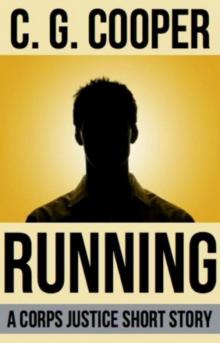 Running
Running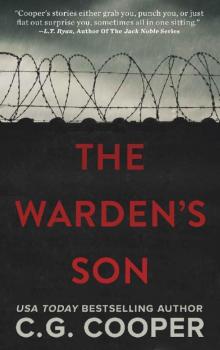 The Warden's Son
The Warden's Son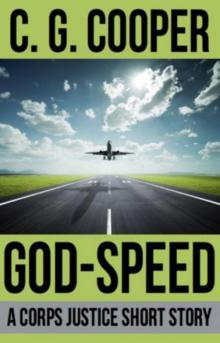 God-Speed
God-Speed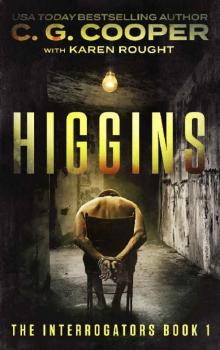 Higgins
Higgins Corps Justice Boxed Set: Books 1-3: Back to War, Council of Patriots, Prime Asset - Military Thrillers
Corps Justice Boxed Set: Books 1-3: Back to War, Council of Patriots, Prime Asset - Military Thrillers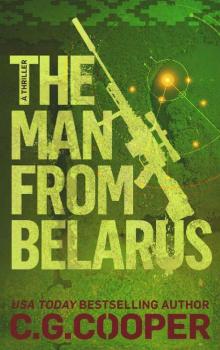 The Man From Belarus (Corps Justice Book 16)
The Man From Belarus (Corps Justice Book 16)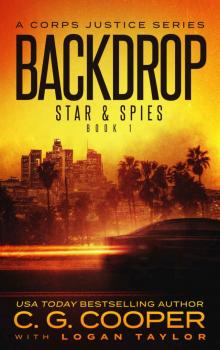 Backdrop: A Corps Justice Series (Stars & Spies Book 1)
Backdrop: A Corps Justice Series (Stars & Spies Book 1)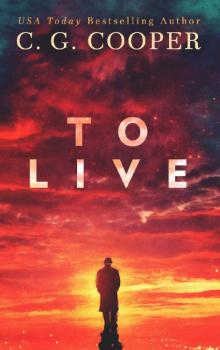 To Live
To Live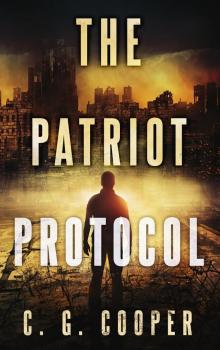 The Patriot Protocol
The Patriot Protocol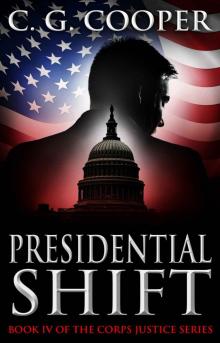 Presidential Shift
Presidential Shift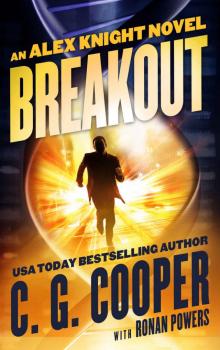 Breakout (Alex Knight Book 1)
Breakout (Alex Knight Book 1)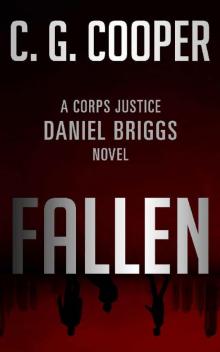 Fallen: A Daniel Briggs Action Thriller (Corps Justice - Daniel Briggs Book 2)
Fallen: A Daniel Briggs Action Thriller (Corps Justice - Daniel Briggs Book 2)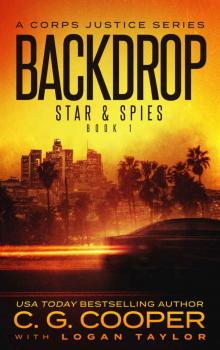 Backdrop
Backdrop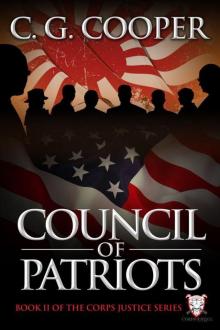 Council of Patriots (The Corps Justice Series Marine Corps Fiction)
Council of Patriots (The Corps Justice Series Marine Corps Fiction)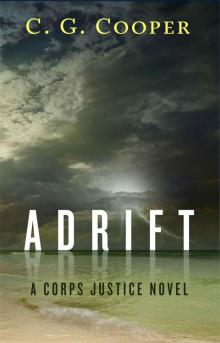 Adrift: The Complete Novel
Adrift: The Complete Novel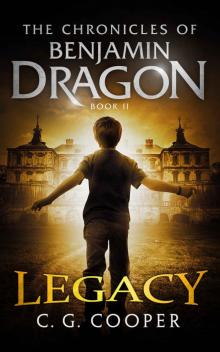 Benjamin Dragon - Legacy (The Chronicles of Benjamin Dragon Book 2)
Benjamin Dragon - Legacy (The Chronicles of Benjamin Dragon Book 2)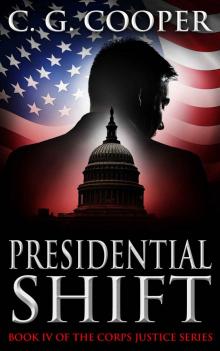 Presidential Shift: A Political Thriller (Corps Justice Book 4)
Presidential Shift: A Political Thriller (Corps Justice Book 4)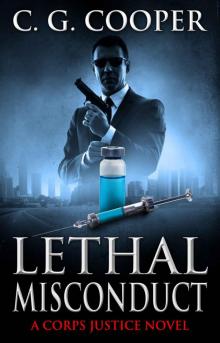 Lethal Misconduct
Lethal Misconduct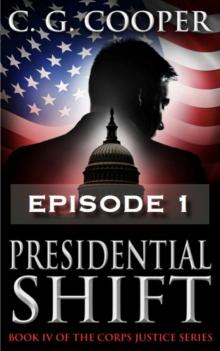 Presidential Shift - Episode 1
Presidential Shift - Episode 1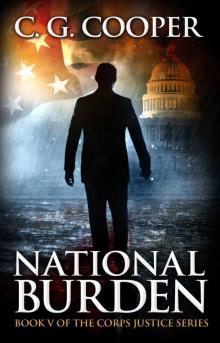 National Burden
National Burden Sabotage
Sabotage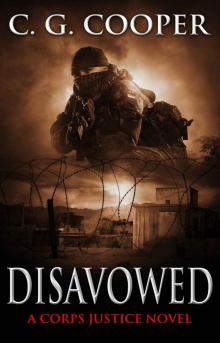 Disavowed
Disavowed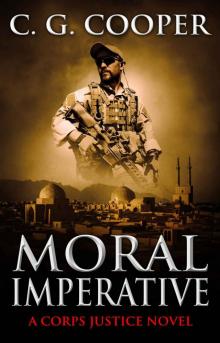 Moral Imperative
Moral Imperative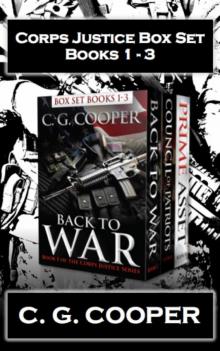 Corps Justice Boxed Set: Books 1-3: Back to War, Council of Patriots, Prime Asset
Corps Justice Boxed Set: Books 1-3: Back to War, Council of Patriots, Prime Asset